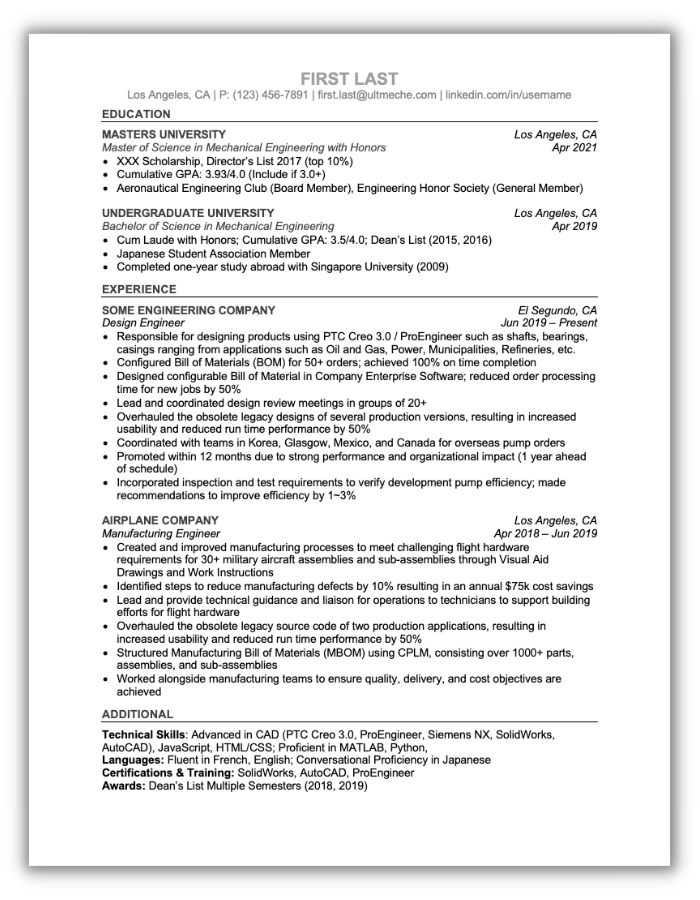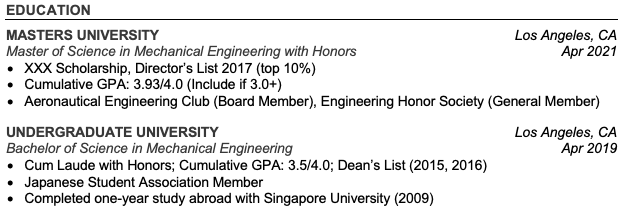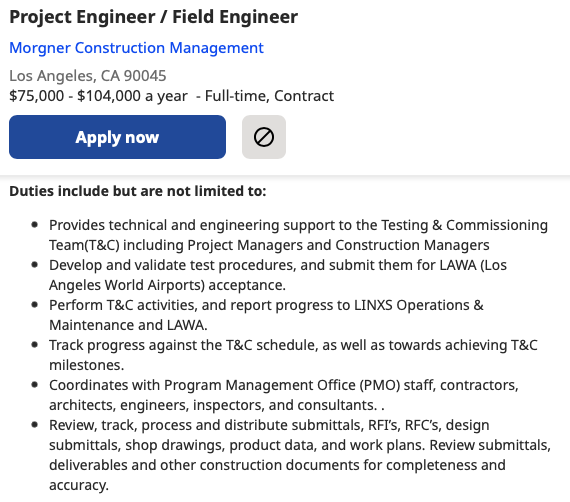
Field Engineering is a lucrative industry and to get in you’ll need a solid Field Engineer Resume. You’ll need keywords, quantitative results, accomplishments, and skillsets on your field engineer resume. The framework you should be using when you write your resume should be to showcase business impact.
Job searching is hard and you’ll need to do everything you can to make your resume stand out. Implement the frameworks below and watch your interview rate skyrocket.
March 2, 2024Field Engineer Resume Requirements
The resume you use to apply for field engineering needs to include experience, education, and relevant skillsets.
See the format we recommend for Field Engineering:

Experience
Ideally, you’ll already have relevant engineering experience available to add onto your resume. Although field engineering specific experience would be the best, other types of engineering is fine to put. Design Engineering, Manufacturing Engineering, Quality Engineering, Test Engineering are some examples of valid experience to put.
The bulletpoints you write for your resume should consist of: subject, action, result
Each bullet should have the subject or project that you were working on, what actions you specifically did, and the result specified in a quantitative manner.
Example
- Oversaw agricultural production capabilities and implemented Lean Manufacturing principles, resulting in savings of $1M in revenue annually
- Configured Bill of Materials (BOM) for 50+ orders; achieved 100% on time completion for projects in the Oil and Gas industry
- Created and improved manufacturing processes to meet challenging flight hardware requirements for 30+ military aircraft assemblies and sub-assemblies through Visual Aid Diagrams
Notice that they all include the subject, action, and result.
Education
Simply state the university and relevant engineering or STEM degree on your resume. Education will be a completely different section on its own. Include undergraduate and master’s (if applicable) along with specific accomplishments pertaining to university.
See sample below:

Skills
Specific field engineering skills include:
- Determining and meeting specific engineering requirements associated to field operations
- Providing technical oversight regarding field machinery and equipment
- Construction and Civil Engineering principles – concrete design, anchor bolt design, seismic load analysis
- Creating processes out on the field to meet engineering requirements and cost objectives
- Interfacing between Project Engineering, Project Management, and Customers/Clients
Field Engineering is alot of working with specific on-site field processes from an engineering standpoint. They are responsible for the technical inputs and outputs, along with specific customer/client/PM interfacing tasks. Field Engineers will need to understand specific engineering systems and principles so that they can perform analysis, testing, and ensure successful operations.
Although soft skills are needed for this role, we don’t recommend the inclusion of soft skills on resume.
Things such as:
- Ability to problem solve
- Ability to work in a fast paced environment
- Working with multiple disciplines to successfully meet customer requirements
Are all fluff and instead you need to be specific when coming up with the bullet points for your resume.
Remember, project, action, and results.
Field Engineer Resume Tips
Use these tips below to take your field engineering resume to the top 1% of your competition.
Many engineers don’t know how to write a resume so implement the below and you will be successful in getting more interviews for Field Engineering roles.
Include Keywords
Including keywords on your field engineering resume is a must.
Look at the keywords on a Field Engineering role in the job description, and make sure you use those when writing bullets.
Make sure each bullet specifies the subject/project, action you took, and the result you achieved.
This shows hiring managers and recruiters that you do more than just basic roles and responsibilities, but that you accomplish things. This also highlights your business impact by doing so.

Showcase your business impact by using quantitative results and accomplishments
This is the biggest mistake that engineers make when applying for jobs. They don’t look at their results and their duties from a business standpoint. They only look at the engineering side of things.
As an engineer, you’re responsible for meeting engineering requirements. But the things that you do as an engineer go so much further beyond that.
Each and every task you do in engineering has a business impact and metric associated with it – budget, revenue, cost savings, etc.
Learn to say how you saved the company money on your resume.
Make your resume clear and concise
When coming up with bullets for your resume, only include the subject, action, and result. Don’t specify anything else on your bullet points. About 1-2 lines is enough for each bullet point on your resume.
The writing of your resume should be “bold”, “straight to the point”, and “professional”. This is the best way that we can describe the type of writing syntax to put on your resume.
The writing on your resume should not feel like a story or a novel. It is merely a summary of your business impact and accomplishments.
Keep it to one page
Ideally, keep your resume to one page. There are certain situations where not doing this is allowable such as if you’re applying for a senior role and have tons of relevant experience.
Otherwise, keep it clear and concise and just to one page.
More writing on your resume does not mean better.
Field Engineering Closing Thoughts
Field Engineers generally work out on the floor or on the field and oversee all things technical related. Maintenance, machinery, operations are some of the things that Field Engineers are responsible for keeping up to par. There are alot of business metrics associated with this responsibility and it’s important that your resume reflects this as a Field Engineer.
What is Field Engineering?
From a high level standpoint, field engineers are service engineers.
They work with technical issues relating to software, hardware, machinery, productions, and operations.
Field engineers are also responsible for the technical liaison between what’s going on the floor and with customers, clients, and project management or project engineers.
Outlook
With the production of high performance engineering components, no matter what industry, going forward we see positive outlook for jobs regarding Field Engineering as a whole.
Industries such as Oil and Gas, Agricultural, Construction, Chemical, and the like will require Field Engineers to ensure smooth business operations.
About the author

Kazuyoshi Fujimoto, PE
Founder | Engineering Career Coach | Principal Mechanical Engineer
Kazu oversees all of ultmeche’s engineering services. He provides consulting such as resume reviews, rewrites, mock interviews, and all services career related. Additionally, Kazu performs consulting work regarding Oil & Gas, Automotive, and Aerospace & Defense. Kazu is licensed as a professional engineer in the state of California and has 9+ years of experience in Oil & Gas, Automotive, and Aerospace & Defense.
